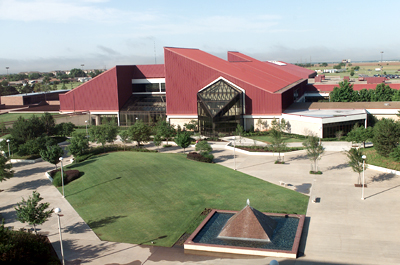OCCC aims to meet student needs

 Janelle Lawson recently came back to OCCC after a 10-year absence. The pre-education major said a lot has improved since she had to put her education on hold a decade ago.
Janelle Lawson recently came back to OCCC after a 10-year absence. The pre-education major said a lot has improved since she had to put her education on hold a decade ago.
“(Back then) they didn’t have anyone telling students how to do an administrative withdrawal,” she said. “So … I had to do some cleanup when I got back.
“Now they do a more excellent job at encouraging students to remain in college. They have programs.
“They express to the students about withdrawing if they are going to get out of classes. That has all changed.”
A recent report from Western Governors University and The SOURCE, an online resource that discusses community college issues, trends and strategies, explored some of the biggest hurdles community colleges face.
The report lists keeping up with advancements in educational technologies and college readiness or remedial course placement of students, among the greatest challenges.
The biggest issue community colleges face, according to the report, is providing incentives and support systems to help keep students like Lawson in school.
Institutional Advancement Executive Director Lealon Taylor said OCCC works to meet those challenges on every level.
“I believe OCCC is a leader among community colleges in looking at breaking down any barrier that’s a hinderance to a person trying to receive a college education,” he said.
“I know that the leadership team, the professors and the staff here at OCCC are constantly thinking about how we can break down barriers so our students can feel comfortable coming here, where they can afford an education, where they can afford textbooks.”
Taylor said OCCC is continually thinking of ways to help students succeed.
“What barriers are there through the enrollment process? What barriers are there through the financial aid process and the advising process? Are there scholarships available? And how can we make it all a seamless system? These are questions that OCCC addresses constantly,” he said.
Lawson said she has found the addition of the Success in College and Life courses to be of great benefit.
She said she believes these classes and the professors who teach them are meeting the challenge of keeping students in school and helping them maintain good GPAs.
OCCC President Paul Sechrist said community colleges also often provide more support than their four-year counterparts with free tutoring for students and labs that offer the latest technology.
Tim Whisenhunt, OCCC’s Technology Support Services director, said the college works hard to affordably meet those challenges.
“I think we are always looking for new technology and applications, but we must make strategic decisions when purchasing technology,” he said.
“With the funding available for purchasing technology, the practice in Technology Support Services has been to attempt to equip as many classrooms and labs with the needed equipment as possible.
In that respect I believe that we have succeeded.”
Whisenhunt said OCCC has about 200 classrooms and labs where faculty and students can present information in a variety of ways.
“As other needs arrive, the rooms are adapted to meet the needs of the instruction style or needs of the class,” he said.
Lawson said she also has an additional challenge that students who live on university campuses will never face — commuting. She said she deals with uncertain variables such as heavy traffic, weather and other vehicle-related issues during her commute from northwest Oklahoma City.
On the flip side, Lawson said, students at commuter colleges may have an advantage over those who live in dorms on campus.
She said those who attend OCCC must demonstrate the will to get themselves to campus — often from areas far away. She added that students at four-year colleges may lose focus on the task at hand as they’re caught up in the other aspects of college life.
“Their focus is going to be on football,” she said. “Their focus is going to be on their sorority and becoming pledges. It’s the wrong mindset to start out your education in. Community college is the best way to get started on the right track.”
Sechrist said some students may want that university experience. He admits two-year college may not be for everyone.
“While there are some advantages to attending a community college, such as lower tuition, smaller class sizes, and generally more support through free tutoring and labs, there are some aspects that most community colleges may not offer which may be part of a university and some students want or need.
“For example,” he said, “to some, having competitive athletics is important. Others may want to play in the university orchestra. Others may see dorm or residential life as an important part of a collegiate experience.
“Each student needs to make a decision based on costs, what programs are offered and what beyond academics a student wants or needs in the experience.
“Community college is a great choice for many students, but definitely not for everyone.”
Lawson said she is glad she decided to start her education at a two-year school. “I suggest students always start out at a community college because they are going to experience a different mentality,” she said. “People are more serious about their education.
It’s good to be around that.”
To contact Jorge Krzyzaniak, email seniorwriter@occc.edu